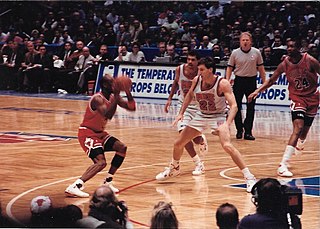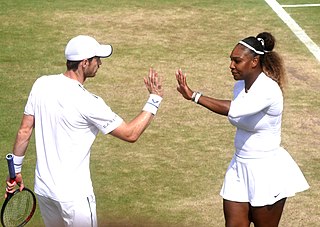
Gender includes the social, psychological, cultural and behavioral aspects of being a man, woman, or other gender identity. Depending on the context, this may include sex-based social constructs as well as gender expression. Most cultures use a gender binary, in which gender is divided into two categories, and people are considered part of one or the other ; those who are outside these groups may fall under the umbrella term non-binary. A number of societies have specific genders besides "man" and "woman," such as the hijras of South Asia; these are often referred to as third genders. Most scholars agree that gender is a central characteristic for social organization.
A gender role, or sex role, is a set of socially accepted behaviors and attitudes deemed appropriate or desirable for individuals based on their sex. Gender roles are usually centered on conceptions of masculinity and femininity, although there are exceptions and variations.

Sociology of sport, alternately referred to as sports sociology, is a sub-discipline of sociology which focuses on sports as social phenomena. It is an area of study concerned with the relationship between sociology and sports, and also various socio-cultural structures, patterns, and organizations or groups involved with sport. This area of study discusses the positive impact sports have on individual people and society as a whole economically, financially, and socially. Sociology of sport attempts to view the actions and behavior of sports teams and their players through the eyes of a sociologist.

The participation of women and girls in sports, physical fitness, and exercise has existed throughout history. However, participation rates and activities vary in accordance with nation, era, geography, and stage of economic development. The modern era of organized sports did not begin to emerge either for women or men until the late industrial age.

Sports journalism is a form of writing that reports on matters pertaining to sporting topics and competitions. Sports journalism has its roots in coverage of horse racing and boxing in the early 1800s, mainly targeted towards elites, and into the 1900s transitioned into an integral part of the news business with newspapers having dedicated sports sections. The increased popularity of sports amongst the middle and lower class led to the more coverage of sports content in publications. The appetite for sports resulted in sports-only media such as Sports Illustrated and ESPN. There are many different forms of sports journalism, ranging from play-by-play and game recaps to analysis and investigative journalism on important developments in the sport. Technology and the internet age has massively changed the sports journalism space as it is struggling with the same problems that the broader category of print journalism is struggling with, mainly not being able to cover costs due to falling subscriptions. New forms of internet blogging and tweeting in the current millennium have pushed the boundaries of sports journalism.

A team sport is a type of sport where the fundamental nature of the game or sport requires the participation of multiple individuals working together as a team, and it is inherently impossible or highly impractical to execute the sport as a single-player endeavour. In team sports, the cooperative effort of team members is essential for the sport to function and achieve its objectives. The objective often involves teammates facilitating the movement of a ball or similar object in accordance with a set of rules in order to score points. Examples are basketball, volleyball, rugby, water polo, handball, lacrosse, cricket, baseball, and the various forms of football and hockey. These sports emphasize teamwork, strategy, and coordination among team members while competing against opposing teams to achieve a common goal. Team sports do not include individual or individual-to-team events within a sport.

Sports in the United States are an important part of the nation's culture. Historically, the national sport has been baseball. However, in more recent decades, American football has been the most popular sport in terms of broadcast viewership audience. Basketball has grown into the mainstream American sports scene since the 1980s, with ice hockey and soccer doing the same around the turn of the 21st century.

Sociology of the family is a subfield of sociology in which researchers and academics study family structure as a social institution and unit of socialization from various sociological perspectives. It can be seen as an example of patterned social relations and group dynamics.

Women's professional sports are a relatively new phenomenon, having largely emerged within the latter part of the 20th century. Unlike amateur female athletes, professional female athletes are able to acquire an income which allows them to earn a living without requiring another source of income. In international terms, most top female athletes are not paid and work full-time or part-time jobs in addition to their training, practice, and competition schedules. Professional organizations for women in sport are most common in developed countries where there are investors available to buy teams and businesses which can afford to sponsor them in exchange for publicity and the opportunity to promote a variety of their products. Very few governments support professional sports, male or female. Today there are a number of professional women's sport leagues in the United States and Canada.
Michael Alan Messner is an American sociologist. His main areas of research are gender and the sociology of sports. He is the author of several books, he gives public speeches and teaches on issues of gender-based violence, the lives of men and boys, and gender and sports.

The Missouri State High School Activities Association (MSHSAA) is the governing body for high school activities throughout the state of Missouri. Approximately 580 high schools are members of MSHSAA.
In gender studies, hegemonic masculinity is part of R. W. Connell's gender order theory, which recognizes multiple masculinities that vary across time, society, culture, and the individual. Hegemonic masculinity is defined as a practice that legitimizes men's dominant position in society and justifies the subordination of the common male population and women, and other marginalized ways of being a man. Conceptually, hegemonic masculinity proposes to explain how and why men maintain dominant social roles over women, and other gender identities, which are perceived as "feminine" in a given society.

The Navy Midshipmen are the athletic teams that represent the United States Naval Academy. The academy sponsors 36 varsity sports teams and 12 club sport teams. Both men's and women's teams are called Navy Midshipmen or "Mids". They participate in the NCAA's Division I, as a non-football member of the Patriot League, a football-only member of the American Athletic Conference in the Football Bowl Subdivision (FBS), and a member of the Collegiate Sprint Football League (men), Eastern Association of Rowing Colleges (men), Eastern Association of Women's Rowing Colleges, Eastern Intercollegiate Gymnastics League (men), Mid-Atlantic Squash Conference (men) and Eastern Intercollegiate Wrestling Association. Navy is also one of approximately 300 members of the Eastern College Athletic Conference (ECAC).

Gender in youth sports refers to the role and influence that both young male and females have in sports. The participation of youth in sports is a matter that is always trying to be improved and appeal to all genders. There are organizations across the world that are trying to improve the disparity of participation rates between boys and girls. Every sport can be played by both girls and boys.
This is a timeline of women's sports, spanning from ancient history up to the 21st century. It includes both competitive sports and notable physical feats.
Misogyny in sports includes different discourses, actions, and ideologies present in various sporting environments that add, reinforce, or normalize the objectification, degrading, shaming, or absence of women in athletics.
The participation of transgender people in competitive sports, a traditionally sex-segregated institution, is a controversial issue, particularly the inclusion of transgender women and girls in women's sports.

The history of sports in the United States reveals that American football, baseball, softball, and indoor soccer evolved from older British sports—rugby football, British baseball, rounders, and association football, respectively. Over time, these sports diverged significantly from their European origins, developing into distinctly American versions. For example, over time, American football developed its own rules and style, becoming distinctly different from its British predecessor and uniquely American. While baseball's origins can be traced to British bat-and-ball games such as British baseball, its development in the United States also incorporated elements from various other bat-and-ball games. Today, baseball enjoys widespread international popularity, especially in East Asia and Latin America.

Mixed-sex sports are individual and team sports whose participants are not of a single sex. In many organised sports settings, rules dictate an equal number of people of each sex in a team. Usually, the main purpose of these rules are to account for physiological sex differences. Mixed-sex sports in informal settings are typically groups of neighbours, friends or family playing without regard to the sex of the participants. Mixed-sex play is also common in youth sports as before puberty and adolescence, sport-relevant sex differences affect performance far less.

Gender pay gap in sports is the persistence of unequal pay in sports, particularly for female athletes who do not receive equal revenue compared to their counterparts, which differs depending on the sport. According to the research conducted by BBC, "a total of 83% of sports now reward men and women equally". However, it does not mean that the wage gap in sports has narrowed or disappeared. In 2018, Forbes released the list of the top 100 highest-paid athletes, all of them being male athletes. A similar situation also occurred in 2017, where there was only one female athlete – tennis player Serena Williams — who joined the list and ranked No.56. Billie Jean King brought awareness to the issue of unequal pay in the early 1970s, when she was awarded $2,900 less than her male counterpart at the Italian Open. The timeline of the gender pay gap in sports displays the significant events that have occurred since the 1970s













